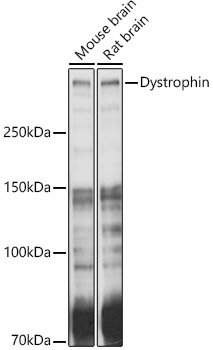![IHC-P analysis of human skeletal muscle tissue using GTX01888 Dystrophin antibody [13H6]. Note membrane staining of normal muscle fibers (A) and reduced and variable staining of revertant muscle fibers (B). IHC-P analysis of human skeletal muscle tissue using GTX01888 Dystrophin antibody [13H6]. Note membrane staining of normal muscle fibers (A) and reduced and variable staining of revertant muscle fibers (B).](https://www.genetex.com/upload/website/prouct_img/normal/GTX01888/GTX01888_20200811_IHC-P_32_w_23053121_605.webp)
IHC-P analysis of human skeletal muscle tissue using GTX01888 Dystrophin antibody [13H6]. Note membrane staining of normal muscle fibers (A) and reduced and variable staining of revertant muscle fibers (B).
Dystrophin antibody [13H6]
GTX01888
ApplicationsImmunoHistoChemistry, ImmunoHistoChemistry Paraffin
Product group Antibodies
ReactivityHuman
TargetDMD
Overview
- SupplierGeneTex
- Product NameDystrophin antibody [13H6]
- Delivery Days Customer9
- Application Supplier NoteIHC-P: 1:10-1:20. *Optimal dilutions/concentrations should be determined by the researcher.Not tested in other applications.
- ApplicationsImmunoHistoChemistry, ImmunoHistoChemistry Paraffin
- CertificationResearch Use Only
- ClonalityMonoclonal
- Clone ID13H6
- ConjugateUnconjugated
- Gene ID1756
- Target nameDMD
- Target descriptiondystrophin
- Target synonymsBMD, CMD3B, DXS142, DXS164, DXS206, DXS230, DXS239, DXS268, DXS269, DXS270, DXS272, MRX85, dystrophin, mutant dystrophin
- HostMouse
- IsotypeIgG1
- Protein IDP11532
- Protein NameDystrophin
- Scientific DescriptionThis gene spans a genomic range of greater than 2 Mb and encodes a large protein containing an N-terminal actin-binding domain and multiple spectrin repeats. The encoded protein forms a component of the dystrophin-glycoprotein complex (DGC), which bridges the inner cytoskeleton and the extracellular matrix. Deletions, duplications, and point mutations at this gene locus may cause Duchenne muscular dystrophy (DMD), Becker muscular dystrophy (BMD), or cardiomyopathy. Alternative promoter usage and alternative splicing result in numerous distinct transcript variants and protein isoforms for this gene. [provided by RefSeq, Dec 2016]
- ReactivityHuman
- Storage Instruction-20°C or -80°C,2°C to 8°C
- UNSPSC12352203



